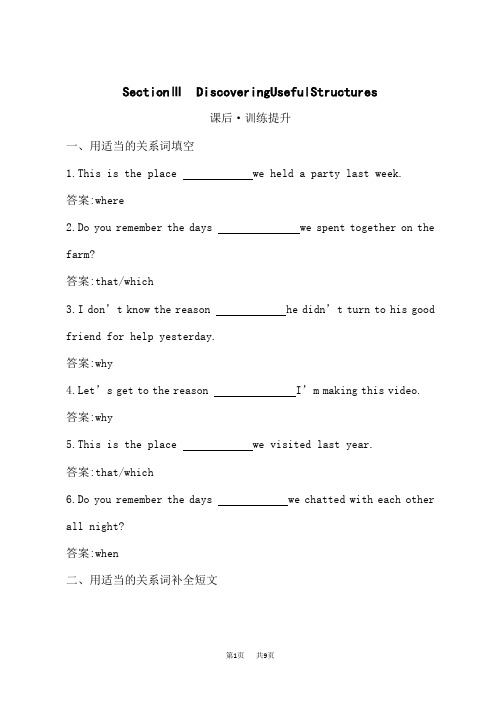高一英语 Unit 5 Why do you do that(双语版)
- 格式:doc
- 大小:20.50 KB
- 文档页数:6

单元素养评价(五)UNIT4NATURAL DISASTERS第一部分听力(共两节,满分30分)第一节(共5小题;每小题1.5分,满分7.5分)听下面5段对话。
每段对话后有一个小题,从题中所给的A、B、C三个选项中选出最佳选项,并标在试卷的相应位置。
听完每段对话后,你都有10秒钟的时间来回答有关小题和阅读下一小题。
每段对话仅读一遍。
1.What does the man ask the woman to do?A.Finish a report.B.Type a letter.C.Type a report.2.What do we know about the new English teacher?A.He is strict.B.He is sick.C.He is patient.3.What is the woman going to do?A.Post something.B.Look for friends.C.Do some shopping.4.What does the woman want to do?A.Have a swim.B.Watch a game.C.Look for someone.5.What do we know from the dialogue?A.There aren't many people in the street.B.The weather is terrible today.C.The traffic is heavy at the time.第二节(共15小题;每小题1.5分,满分22.5分)听下面5段对话或独白。
每段对话或独白后有几个小题,从题中所给的A、B、C三个选项中选出最佳选项,并标在试卷的相应位置。
听每段对话或独白前,你将有时间阅读各个小题,每小题5秒钟;听完后,各小题将给出5秒钟的作答时间。
每段对话或独白读两遍。
听第6段材料,回答第6、7题。



Unit5.知识点,语法,作文背默语法精练why引导的特殊疑问句why作疑问副词,意为“为什么”,用来询问原因、理由,一般由“why+一般疑问句”构成其特殊疑问句式。
由why引导的特殊疑问句,常用because引导的原因状语从句来回答。
because是连词,意为“因为”,其后接句子来阐述原因或理由。
例如:— ?你为什么喜欢英语?—Because it’s interesting.因为它有趣。
注意:why还可以用于委婉地向别人提出建议,常用句型为“Why don’t you+动词原形+其他?/Why not+动词原形+其他?”意为“你为什么不……呢?”例如:?你为什么不和我们一起踢足球呢?where引导的特殊疑问句where作疑问副词,意为“在哪里”,用来询问地点,一般由“where+一般疑问句”构成其特殊疑问句式。
例如:— ?你来自哪里?—I am from China./I come from China.我来自中国。
注意:在疑问副词引导的特殊疑问句中,若句中有be动词,可直接将be动词放在疑问副词后构成疑问句;若句中有实义动词,则需要借助do或does放在疑问副词后构成疑问句。
形容词的用法形容词常用来修饰名词或代词,表示人或事物的性质或状态等。
当形容词作定语时,常用于修饰名词,且位于名词之前;当形容词作表语时,则需要放在系动词之后,构成“系表结构”。
例如:an old book.这是一本旧书。
He .他看起来很高兴。
注意:当形容词作定语修饰something,anything等不定代词时,要放在不定代词的后面。
例如:in today’s newspaper.今天的报纸上有些新鲜事。
语法精练Ⅰ.按要求完成句子,每空一词1.Pandas are from China.( 对画线部分提问) pandas from?2.Jack likes music because it’s relaxing.( 对画线部分提问) Jack like music?3.This boy is from Beijing.( 改为同义句)This boy Beijing.4.Why don’t you join the art club?( 改为同义句) join the art club?5.My sister likes cats.Cats are kind of fun.( 合并为一句)My sister likes cats are kind of fun.知识点精讲SectionA1.family, home和 house 的区别:(1)family 集合名词,表示“家庭”整体的时候,做主语,作为数处理,谓语用单数;表示家庭成员,家属或子女时,做主语,按数来处理。

SectionⅢDiscoveringUsefulStructures课后·训练提升一、用适当的关系词填空1.This is the place we held a party last week.答案:where2.Do you remember the days we spent together on the farm?答案:that/which3.I don’t know the reason he didn’t turn to his good friend for help yesterday.答案:why4.Let’s get to the reason I’m making this video.答案:why5.This is the place we visited last year.答案:that/which6.Do you remember the days we chatted with each other all night?答案:when二、用适当的关系词补全短文Children are always happy on the day 1. summer vacation begins.They think about the plans 2. they have for the summer.Some children go to a-day camp 3. is near their home.At the end of the day,they can go home.Other kids choose to go to a camp in the country 4. they are taught by camp counselors(顾问).These counselors are often college students 5. are trying to earn a little emer vacation.Some kids go to professional camps.There they can improve a particular skill or learn a new hobby 6. they are interested in.This is the reason 7. specialised camps are popular with both parents and kids.There are some kids 8. parents take them on a trip in a car.They often visit state and national parks.答案:1.when 2.that/which 3.that/which 4.where 5.who/that6.which/that7.why8.whose三、阅读理解The number of speakers of English in Shakespeare’s times is estimated to have been about five million.Today it is estimated that some 260 million people speak it as a native language,mainly in the United States,Canada,Great Britain,Ireland,SouthAfrica,Australia and New Zealand.In addition to the standard varieties of English found in these areas,there are a great many regional and social varieties of the language as well as various levels of usage that are employed both in its spoken and written forms.In fact,it is impossible to estimate the number of people in the world who have acquired an adequate(足够的) working knowledge of English in addition to their own languages.The purposes of English learning and the situations in which such learning takes place are so varied that it is difficult to eore difficult to judge what forms an adequate working knowledge for each situation.The main reason for the widespread demand for English is its present-day importance as a world language.Besides serving the indefinite needs of its native speakers,English is a language in which some of important work in science,technology,and other fields is being produced,and not always by native speakers.It is widely used for such purposes as meteorological and airport communications,international conferences,and the spread of information over the radio and television networks of many nations.It is a language of wider communication for a number ofdeveloping countries,especially former British colonies.Many of these countries have multilingual populations and need a language for internal communication in such matters asgovernment,commerce,industry,law and education as well as for international communication and for entrance to the scientific and technological developments in the West.1.Which is the best title for this passage?A.The Difficulties of Learning EnglishB.International CommunicationsC.The Standard Varieties of EnglishD.English as a World Language答案:D解析:标题归纳题。

Unit 51.西蒙受他父母的影响,在蔬菜和肉类之间喜欢蔬菜。
( influence, prefer)2.这支包括四名工程师和两名教授在内的队伍明天将前往那个偏远的村庄。
( including)3.看到动物被杀的残忍方法后,她变成了个素食者。
(cruel)4.这本书含有一切你所需的资料。
5.音乐会有12个表演,其中一个是由美国学生表演的舞蹈。
(contain, include)6.我们不再用木头而用塑料。
(instead)7.Tom 没出去踢球而是待在家里了。
(instead)8.我们是走路去参加讲座的而不是乘车。
(instead)9.我不想影响你,你必须自己决定。
(influence)10.他非但不听我的劝告,反而事事与我作对。
(instead)11.上下班高峰时候,公共汽车挤满了乘客。
(crowd)12.这些有关肉类工业的节目对素食者们有很大的影响。
(influence)13.昨天他们去购物了,没去爬山。
(instead)14.家长的行为将极大地影响孩子的成长。
(influence)15.如今越来越多的人用电子邮件而不是信件来和朋友保持了解。
(instead)16.这支队伍由10人组成,其中包括两名医生。
(include)17.他一下午一直在玩游戏而不是做作业。
(instead)18.这菜的怪味让我倒了胃口。
(appetite)19.专家建议我们最好多吃含有维生素的蔬菜和水果。
(contain)20.为了防止母牛得病,农民们给它们吃药。
(drug)21.孩子们总是被各种各样的电视节目所影响。
(influence)22.孩子们通常每天要花一到两小时完成回家作业。
(spend)23.这则关于饮食和健康的短文使我失去了对肉的胃口。
(appetite)24.吃饭时,他们改变了话题而不是谈论是否吃肉。
(instead)25.自从他生病以来,他已经很久没有这么好的胃口了。
(appetite)26.毫无疑问,环境对孩子的成长有很大的影响。
高一英语第五单元Why do you do that ?科目英语年级高一文件 high1 unit5.doc标题 Why do you do that ?章节第五单元关键词内容一、目地与要求:掌握本单元出现的单词和词组。
如:feed, fact, free, fetch, so that, grow up , in fact, be made from, in the past, in order to , wash away, break the rule, stop sb from doing, be covered with, so as to do…;二、本单元知识重点与难点分析:1.I\'ll keep the box in the shade so that the sun doesn\'t burn the little plants 我会把这个盒子放在阴凉地方,这样太阳就不会把幼苗晒枯。
本句中的so that 作“以便,为了,使能够”解,引导目地状语从句。
例如:He got up early so that he could catch the first bus.他起床很早以便赶上头班车。
Please speak louder so that everyone can hear you.请再大声点说,以便大家都能听到你说的话。
I\'ll put some powder on the soil so that the little plants will grow better.我会在土上加一些肥粉,以便使幼苗长的更好。
So that也可以引导结果状语从句,主句和从句是原因与结果的关系,作“因此”解,例如:He often told lies, so that no one believed him.他常常说谎,因此没有人相信他的话。
He turned up the radio, so that everyone heard the important news.他把收音机的音量调大了,结果大家都听到这条重要新闻了。
Why do you do that-教学教案教学目标教学目标与要求通过本单元教学,使同学学会使用表示目的用语,并运用到日常交际。
复习一般现在时,一般过去时和含有情态动词的被动语态的用法。
使同学学会写种植西红柿的过程。
教学的重点和难点Words and expressionsburn, free, operate, obey, punish, so that, in order to, make sure, stop. . . (from) doingDaily expressions1〕I’ll keep the box in the shade so that the sun doesn’t bum the little plants.2〕I’ll water them to stop the soil getting too dry.Grammar1.Ways of expressing purposes2.Revision of the Passive Voice教学建议力量训练1.利用对话、课文,组织同学进行听、说、读、写的训练。
2.利用新单词、词组及日常交际用语,组织同学造句、编对话、表达课文、表达思想等。
德育教学通过对话和课文的学习,唤起同学对大自然的爱心,使他们生疏到爱护环境的重要性。
互动活动1、听、读2、问答练习3、造句4、编演对话5、争辩6、复述课文7、讲故事听力建议1.建议老师在听之前,或许介绍所听材料的内容或背景学问,这样同学们能够抓住要点,同时老师也为了让同学们理解得更清楚,也可提前把问题写在黑板或让同学们先看问题,然后听磁带。
2.在20课131页的听力练习,主要内容讲解一对英国夫妇的农场,老师在放磁带之前,让同学们看一看每道练习题的大致问的内容,放完一遍后,老师可问一到两个同学农场的概况,然后老师依据问题的内容在分别放磁带。
口语建议1、老师坚持用英语组织课堂教学的方向,尽量给同学制造英语的真实情景。
高一上册
Unit 5 Why do you do that?
你为什么这么做?
Lesson 17 1 Dialogue
Mick is in the garden with his mother.He has got lots of questions to ask.
米克和妈妈在菜园里。
他有很多问题要问。
Mick: What are you doing,Mum?
米克: 妈妈,你在干什么?
Mum: I'm sowing cabbages.
妈妈:我在播白菜种子。
Mick: What's that in your hand?
米克: 你手里拿的是什么?
Mum: Cabbage seed. You see,I put some soil in the box,sow the seed carefully like this,and then cover it with more soil.I'll keep the box in the shade so that the sun doesn't burn the little plants.
妈妈:白菜种子。
你瞧,我在盒子里放些泥土,像这样小心的把种子播下,然后再用多一点儿的土盖住种子。
我将把盒子放在阴凉的地方,这样太阳就不会把幼苗晒枯。
Mick: Is that all?
米克: 就是这些吗?
Mum: No. Later,in a few weeks' time I'll put the little plants in the earth.Then I'll water them to stop the soil getting too dry.Several weeks after that,I will plant them in rows in the field.
妈妈:不止,几星期以后,我要把菜秧移到地里。
然后,我还要给他们浇水,以免土壤变得太干燥。
再过几个星期,我还要把它们一行行的栽到菜地里。
Mick: Do you have to feed plants like you feed chickens? Or do they grow up by themsevles?
米克: 你得要像喂小鸡那样去喂幼苗吗?还是它们自己长大呢?Mum: In fact they grow better if you feed them.When the plants are in the ground I'll put some powder on the soil.
The powder is made from fish,blood and bones.It'll make the cabbage plants grow big and strong.
妈妈:事实上,要是你给它们浇水施肥,它们会长得更好,白菜在地里生长时,我得在土壤里施些肥粉。
肥粉是由鱼、血和骨头做成的。
它能使白菜秧长得又大又壮。
Mick: Like me!
米克: 就象我一样强壮!
Lesson 18
Reading
Read the passage to find the answer to this question:
What has changed in the past few years?
THE GREEN HILLS OF TANGSA
坦萨村的青山
The village people of Tangsa in northern India love their forests.Trees grow thickly on all the hills around the village.Even in the village itself,young trees are growing.
A few of them can be cut each year for firewood.The rest are left to grow even taller.
位于印度北部的坦萨村村民热爱自己的森林。
村庄周围所有的
山上都长着茂密的树木。
就连村庄里面也都长满小树。
每年一些小
树被砍掉当柴烧,其余的留下来,好让它们长得更加高大。
All of this is new.In the past there were no trees left in
or around the village.People had to walk many kilometres in order to fetch wood.Trees were cut but none were planted. When it rained,the soil was carried away down the hills and into the rivers.
这一切都是新的景象。
过去村子里和村子周围都没有留下什么
树木。
村民要走许多里路去打柴。
那时只砍树,不植树。
下雨时,
土壤从山上冲刷下来,流进河里。
In 1973 some strangers arrived.They wanted to cut down a large forest in the area.The villagers did not allow them
to do this.They said the forest was theirs.They knew they had to save the trees.If not,they would have no wood at all. As a result,they saved 90% of the trees in the forest.They began to understand how important the forest is.If they cut trees,they must also plant new ones.
1973年,村上来了一些外地人。
他们想砍伐该地区的一大片
森林。
村民们不许他们这样做。
村民们说森林是他们的。
他们知道必须拯救树木。
否则他们就根本不会有木材了。
结果他们拯救了这片森林90%的树木。
他们开始懂得森林有多么重要。
要砍树,就得
植树。
Today there is a forest programme in 70 villages in this area.Meetings are held in order to explain the programme to the villagers.It is operated by the women of the area.Twice a year,large teams of women plant thousands of trees.These small trees are given to the villagers and they are free. The village women water the trees.They also make sure the cows do not knock them down or eat the leaves.Between 1975 and 1980 more than 1.2 million trees were planted.
目前在这个地区70个村庄有造林计划。
他们召开会议向村民们宣讲计划。
这个计划由该地区的妇女来实施。
大批大批的妇女每年造林两次,种植上千万株树。
这些小树无偿地送给村民。
村里的妇女们给树浇水。
她们还要确保牛群不会撞倒小树或吃掉树叶。
1975到1980年期间一共种植了120多万株树。
Since then,the forests have grown.People are not allowed to
cut down trees when they are still small.They are only allowed to cut down trees when they are big enough. Everyone obeys the rules;anybody who breaks the rules in punished.So everybody now takes good care of the forests around their village.And the forests have grown,larger and better
自那以后,森林成长起来了。
树木还小时,是不允许砍伐的。
只有当树长得够大时才允许砍伐。
每个人都要遵守规章制度,谁要是违反了这些规章制度谁就会受到处罚。
因此,每个人现在都细心照看自己村庄周围的森林,结果森林成长起来了,而且越来越高大,越来越美丽。